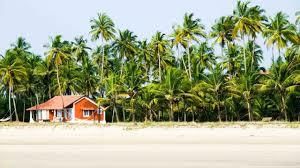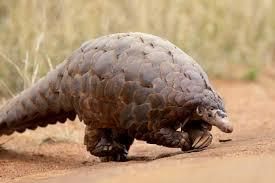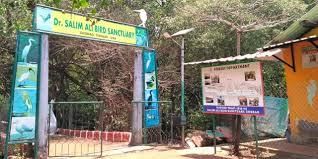GPSC (Goa) Exam > GPSC (Goa) Notes > Goa State PSC (GPSC) Preparation > Goa: Wild life and Ecotourism
Goa: Wild life and Ecotourism | Goa State PSC (GPSC) Preparation - GPSC (Goa) PDF Download
| Table of contents |

|
| Wildlife and Ecotourism of Goa |

|
| Plants & Trees in Goa |

|
| Animals in Goa |

|
| Birds in Goa |

|
| Goa Wildlife Sanctuaries |

|
| Ecotourism in Goa |

|
Wildlife and Ecotourism of Goa

- The Western Ghats in Goa, known as the Sahyadris, offer a diverse habitat for numerous species of birds and animals, serving as a migration corridor.
- Extending for 600 kilometers within Goa out of their total span of 3702 kilometers, the Western Ghats boast the widest expanse of forests in the region, shared with neighboring Karnataka.
- Goa's coastal regions provide a lush tropical environment, fostering a rich biodiversity.
- Unique plant and tree species are found in Goa, some introduced by the Portuguese. An example is the green chili, now an integral component of Indian cuisine.
- Goa experiences an average rainfall exceeding 500 mm along the Western Ghats, with a slightly lower amount elsewhere. The dry season typically lasts between 5 to 6 months.
- Due to these climatic conditions, Goa's dominant vegetation predominantly comprises moist deciduous forests.
- Goa boasts a remarkable biodiversity with documented species including over 1512 plants, more than 275 bird genera, around 48 animal genera, and over 60 reptile genera.
- Approximately 10% of Goa's land is designated as wildlife reserves, incorporating four significant wildlife sanctuaries.
Plants & Trees in Goa
- Goa boasts over 3000 diverse species of flowering plants, excluding numerous varieties of grasses, ferns, and brackens.
- The iconic coconut palm is prevalent throughout the region, adorning the coastlines and vast rural plantations.
- Large privately owned plantations across the state feature cashew nut and mango trees, contributing significantly to the export industry.
- A rich array of flowering trees and plants grace towns and villages with a vibrant display of colors and sizes, particularly striking before the monsoon season.
- Abundant trees such as the banyan, peepal, sisso or martel, kharanj, and teak further enhance the natural landscape of Goa.
Animals in Goa

- Goa is home to a diverse range of animals that contribute to its unique ecosystem.
- Goa is home to a diverse array of wildlife, boasting nearly fifty species of mammals. Some of the prominent mammals in the region include the leopard, various monkeys, cheetal (spotted axis deer), sambar, barking deer, mouse deer, leopard cat, Indian civet, Indian bison (gaur), sloth bear, Indian porcupine, pangolin, slender loris, wild boar, striped hyena, jackal, wild dog, and mongoose.
- Additionally, Goa hosts four species of bats, with flying foxes being particularly abundant in rural areas. The Indian giant squirrel, three-striped squirrel, and five-striped palm squirrel are commonly sighted across the region.
- Long-beaked dolphins are a frequent sight in the shallow waters along Goa's secluded beaches.
- The reptilian and amphibian population of Goa is substantial, encompassing species like the common house gecko, various frogs, and the rare monitor lizard.
- Two species of crocodiles primarily inhabit the banks of certain inland waterways. The region is also home to a diverse snake population, including non-venomous types like the common blind snake, Russell sand boa, Indian python, Indian wart snake, trinket snake, Indian rat snake, and golden tree snake, as well as venomous species such as the king cobra, common Indian krait, coral snake, Russell's viper, saw-scaled viper, and bamboo pit viper.
- Furthermore, Goa supports both freshwater turtles and rare marine turtles, the latter of which come ashore between October and December to lay their eggs in the sand.
Birds in Goa
Goa is home to a vibrant birdlife, featuring many colorful species:
- Kingfishers: Stork-billed kingfisher, breasted kingfisher, and common kingfisher.
- Bee-eaters: Grass-green, blue, and yellow bee-eaters.
- Other Colorful Birds: Golden oriole, Indian roller, and paradise flycatcher.
- Sunbirds: Purple sunbirds.
- Bulbuls, Babblers, and Drongos: Various species.
- Egret Species: Snowy white cattle egret, large egret, and little egret.
- Birds of Prey: White-bellied fish eagle, Brahminy kite, and pariah kite.
- Carrion Eaters: House crows, jackdaws, king vultures, and white-backed vultures.
- Forest Birds: Grey hornbill, Indian pied hornbill, great pied hornbill, lesser goldenback woodpecker, Indian great black woodpecker, and red junglefowl.
Goa Wildlife Sanctuaries

- Goa is home to three famous wildlife sanctuaries that preserve the thick forests and habitats along the slopes of the Western Ghats:
- Bhagwan Mahavir Wildlife Sanctuary
- Bondla Wildlife Sanctuary
- Cotigao Wildlife Sanctuary
- Additionally, Goa has the renowned Salim Ali Bird Sanctuary, known for its rich birdlife.
Salim Ali Bird Sanctuary

- Salim Ali Bird Sanctuary stands out as a significant avian sanctuary within India.
- Located a short stroll away from the ferry ghat, this sanctuary rests in proximity to Mandovi River, making it easily accessible.
- At the western edge of the island along Mandovi River, visitors can revel in the vibrant avian life and the beauty of nature.
- Honoring India's renowned ornithologist, Sir Salim Ali, this sanctuary is a haven for both local and migratory bird species, attracting bird enthusiasts and nature lovers alike.
- Encompassing mangrove forest plantations and scrubs along Mandovi and Mapusa River, and the Cumbarjua Canal, the sanctuary serves as a habitat for diverse avian species, amphibians, and crocodiles.
- From waterfowls to migratory birds, a plethora of bird species find refuge here, including resident birds nurtured within the sanctuary's confines.
- The sanctuary's watchtower offers a prime vantage point for tourists to observe the birds in their natural habitat.
- Throughout the year, the Salim Ali Bird Sanctuary welcomes visitors, requiring prior permission from the Chief Wildlife Warden of the Forest Department in Panaji.
- Dawn and dusk emerge as optimal times for bird watching, while nature walks provide an excellent opportunity to spot birds perched on tree branches and tree-tops.
Bhagwan Mahavir Wildlife Sanctuary
- The Bhagwan Mahavir Wildlife Sanctuary is accessed through the quiet village of Molem and serves as the entrance point to this expansive natural reserve.
- Located 54 kilometers away from Margao, the sanctuary's primary access is through NH4A.
- Covering an extensive area of 240 square kilometers, it includes the Molem National Park, which spans 107 square kilometers.
- Visitors can witness a variety of wildlife at the sanctuary, such as the jungle cat, gaur, leopard, elephant, deer, Malayan giant squirrels, and a diverse bird population.
- An observation platform within the park provides opportunities to observe these animals in their natural habitat. Accommodations are available at the GTDC Dhudhsagar Resort in Molem.
Bondla Wildlife Sanctuary
- Located 52 km from Panaji in the Western Ghats, Bondla stands as Goa's smallest and most accessible wildlife sanctuary, sprawling across 80 sq km.
- The sanctuary not only boasts a rich diversity of flora and fauna but also houses a botanical garden and a zoo, catering to tourists eager to witness wildlife.
- Among the prominent wild species inhabiting Bondla are gaur, wild boar, and sambar, offering visitors a glimpse into Goa's natural heritage.
- Accessible from Ponda to Usgao village, Bondla serves as a prime destination for nature enthusiasts and wildlife lovers.
National Park of Goa

Question for Goa: Wild life and EcotourismTry yourself: Which wildlife sanctuary in Goa is the smallest and most accessible?View Solution
Ecotourism in Goa
- Ecotourism, distinct for its low impact on the environment, is described as "Responsible travel to natural areas that conserves the environment and enhances the well-being of local communities."
- This form of tourism not only showcases Goa's unique natural and cultural heritage but also contributes to the livelihoods of local residents.
Vision of Ecotourism
- Ecotourism aims to encourage responsible travel to natural areas, allowing visitors to intimately engage with and quietly appreciate the state's natural and cultural heritage.
- This approach ultimately leads to nature conservation, the preservation of ecological processes, heightened respect for local traditions, and a tangible boost to the local economy.
Goal of Ecotourism
- The primary goal of ecotourism is to offer recreational opportunities while fostering an understanding of nature and wildlife conservation.
- Simultaneously, it aims to generate income and provide employment to local communities. This emphasis prioritizes biodiversity conservation, ecosystem health, and socio-economic progress.
Ecotourism Principles
Ecotourism development aligns with the overarching vision, goal, and objectives previously outlined. It operates based on a core set of principles:
- Conservation Orientation: Ecotourism activities focus on preserving the natural environment and its biodiversity. For instance, guided tours in national parks help educate visitors on the importance of conservation.
- Community Involvement: Local communities are actively engaged in ecotourism initiatives, benefiting from income opportunities and employment. An example could be indigenous tribes leading cultural tours to showcase their heritage.
- Educational Component: Ecotourism serves as a platform for educating visitors about environmental issues, wildlife conservation, and sustainable practices. Educational workshops during eco-trips enhance awareness and understanding.
- Sustainable Practices: Ecotourism operations prioritize sustainable practices to minimize environmental impact. This includes using eco-friendly accommodations, promoting waste reduction, and supporting local organic food production.
The document Goa: Wild life and Ecotourism | Goa State PSC (GPSC) Preparation - GPSC (Goa) is a part of the GPSC (Goa) Course Goa State PSC (GPSC) Preparation.
All you need of GPSC (Goa) at this link: GPSC (Goa)
FAQs on Goa: Wild life and Ecotourism - Goa State PSC (GPSC) Preparation - GPSC (Goa)
| 1. What are some popular wildlife sanctuaries in Goa? |  |
Ans. Some popular wildlife sanctuaries in Goa include Bhagwan Mahavir Wildlife Sanctuary, Mollem National Park, Cotigao Wildlife Sanctuary, and Bondla Wildlife Sanctuary.
| 2. What are some common animals found in Goa? |  |
Ans. Common animals found in Goa include the Indian bison, sambar deer, wild boar, and various species of monkeys.
| 3. What are some popular bird species in Goa? |  |
Ans. Popular bird species in Goa include the white-bellied sea eagle, Malabar pied hornbill, and the greater flamingo.
| 4. What is ecotourism and how does it relate to Goa? |  |
Ans. Ecotourism is a form of tourism that focuses on responsible travel to natural areas to conserve the environment and improve the well-being of local people. In Goa, ecotourism plays a significant role in promoting the conservation of wildlife and natural habitats.
| 5. How can tourists experience wildlife and ecotourism in Goa? |  |
Ans. Tourists can experience wildlife and ecotourism in Goa by visiting wildlife sanctuaries, participating in guided nature walks, birdwatching tours, and staying in eco-friendly accommodations.
Related Searches














